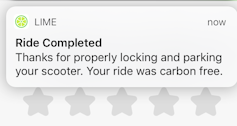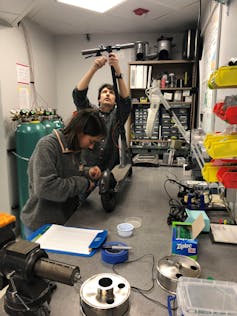Electric Scooters Good for the Planet? Only If They Replace Car Trips

Shutterstock/bakdc
COMMENTARY | With tweaks to city policies and company practices, there are opportunities to make scooters a greener option.
Shared dockless electric scooters, or e-scooters, transport riders over short distances in cities. Ride share companies promote them as an environmentally friendly choice that reduces dependence on cars.
To properly assess these claims, it’s important to consider all relevant environmental factors, including the materials and energy required to manufacture scooters, the impacts of collecting them daily for charging and redistributing, and the electricity that charges their batteries.
I study methods for assessing environmental impacts of products and materials. In a newly published study, I show that e-scooter programs may have larger total environmental impacts than the transportation modes they displace. But if cities update their policies and mobility companies tweak some of their practices, there are opportunities to make e-scooters a greener option.
The Electric Scooter Boom
Anyone who lives in a city or near a college campus has probably seen e-scooters. Designed for short-distance travel, these devices have a small electric motor and deck on which a single person stands. Ride share companies such as Bird and Lime rent out scooters by the minute, and riders leave them at their final destination to be claimed by the next user or picked up later for charging.
In 2017 these programs were rare, but in 2018 riders took an estimated 38.5 million trips on e-scooters. These devices fill a singular niche for some people, solving the “last mile problem”—the last leg of a trip, which sometimes can be the most difficult, since it may mean walking home from a bus stop or train station. Scooters are an alternative to driving and parking a personal automobile, and often are cheaper than a taxi or Uber.
'Your Ride Was Carbon Free'—Really?
The transportation sector generates nearly one-third of U.S. greenhouse gas emissions and a large share of smog and asthma-inducing pollutants. With no tailpipes to spew emissions, it would be easy to assume that shared e-scooters are an environmentally preferable option. E-scooter companies often tout the environmental benefits of their “carbon-free” and “earth-friendly” rides.

To support these claims, Lime has pledged to purchase renewable energy credits to cover the electricity it uses for charging and carbon offsets for their operations. Bird purchases renewable energy credits and carbon offsets to cover electricity and scooter pick-up and drop-off.

However, claims of a full carbon-free ride don’t hold up when all of the actions required to have an e-scooter ready, at the right location and charged for use are considered. With North Carolina State University engineering students Joseph Hollingsworth and Brenna Copeland, I turned to a life cycle approach to fill in the gaps.
Hidden Impacts
Chinese electronics company Xiaomi manufactures many of the e-scooters used in the United States. To understand what materials go into each scooter, we took one apart and inventoried the 13 pounds of aluminum, 2.5-pound lithium-ion battery, electric motor and various plastic and steel parts.
Manufacturing these scooters and other electronic products has effects at the mine site, the smelter and the factory. For e-scooters, we calculated that these production impacts often exceed half of the total impacts caused by each mile of travel on a scooter.
Shipping e-scooters from China to the U.S., however, has a trivial effect, thanks to the efficiency of the global transportation network.

E-scooter companies employ independent contractors to collect, charge and redistribute the scooters to desirable locations. Lime calls these folks Juicers. Their counterparts at Bird are Chargers, and they distribute the fully charged scooters into Nests.
These collectors typically drive their personal automobiles to round up as many scooters as they can, then charge them at home and return them the next day. The logistics are not optimized, which leads to unnecessary driving on the hunt for scooters. We found that this mileage can generate over 40% of the total environmental impacts of e-scooter use.
In contrast, powering e-scooters requires relatively little energy. Charging a fully depleted e-scooter battery uses about as much electricity as running an average clothes dryer for five minutes. And most e-scooter batteries are nowhere near fully depleted when picked up, particularly in cities that require companies to remove scooters from the streets each night. In Raleigh, we found that about one out of six scooters were over 95% charged at the end of the day, but were still picked up for nightly charging.
Other Ways to Get There
It is important to consider what e-scooters are displacing when quantifying their relative effects on the environment. Surveys show that about one-third of e-scooter rides replace automobile use, while nearly half of scooter users would have walked or biked instead. About 10% would have taken public transit, and the remaining 7% or 8% would not have made the trip at all.
Our study found that driving a car is almost always less environmentally friendly than using an e-scooter. When only one-third of e-scooter rides displace automobile travel, then the use of e-scooters likely increases overall transportation emissions by drawing people away from walking, biking or taking public transit. However, if e-scooters were to displace car rides half the time, we would expect them to be a net win for the environment on average.
Lightening Scooters' Footprint
Our research highlights several ways to make these scooters more sustainable. Using e-scooters that are designed to be more durable can reduce environmental impacts from the materials used to build them on a per-mile traveled basis. Improving collection and distribution processes could reduce driving distances, and companies could use more fuel-efficient vehicles to collect the scooters. For their part, cities could allow scooters to be left out overnight and only picked up when their batteries are depleted.
For now, however, a scooter ride that doesn’t replace a car trip is unlikely to be a net win for the planet.
Jeremiah Johnson is an associate professor of environmental engineering at North Carolina State University.
This article is republished from The Conversation under a Creative Commons license. Read the original article.
NEXT STORY: The Role States Are Playing in Expanding Broadband Access





